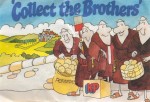Sorry, bad puns once again.
 In the early 1980's a jolly band of cartoon friars advertised crisps. They probably wouldn't be allowed to nowadays, crisp eating is hardly synonymous with healthy lifestyles or the being of a monk-type person.
In the early 1980's a jolly band of cartoon friars advertised crisps. They probably wouldn't be allowed to nowadays, crisp eating is hardly synonymous with healthy lifestyles or the being of a monk-type person.
Today I was reading about a 'Chalcedonian Corelation' for the interdisciplinary nature of practical theology, which I'll get to in a bit, but its reference to 'logical priors' took me back to my engineer days and the images conjured up by 'Bayesian Priors' (which are mathematical).
In my imagination, Bayesian Priors were an order of rather rotund monks in brown habits with jolly faces who laughed a lot - and probably understood some of the mathematical concepts about as well as most Christians understand Chalcedon.
Logical Priors sound much less jolly - they are tall, thin monks in grey habits with long noses and serious expressions. They are very kindly folk, but deadly, deadly serious.
So, to Chalcedonian Correlation (which maybe should be Caledonian Correlation since it comes from Scotland!)
It asserts that there are four factors...
- Indissoluble differentiation
- Inseparable unity
- Indestructible order
- Logical prioity of theology
Indissoluble differentiation (which to a mathemetican doing calculus is a nonsense btw) means that theology is not history/psychology/anthropology etc and vice versa - the disicplines are not each other and definable boundaries exist.
Inseparable unity means that despite this, the various disciplines can inform each other and, perhaps (though this is now my interpretation) are part of greater whole through which God's revelation occurs.
Indestructible order means that there is effectively a hierarchy of authority. Crudely, this suggests that subjects that refer out to others are higher up (I think) the authority tree. Thus, theology has precedence over sociology because while theology may call up sociology, the converse is not (so they argue) true. The logical priority of theology is, they assert, given.
I think this idea - which does get a bit more discussion in the book which I have yet to read, is interesting, but not automatically universally seen as true. I can see that a psychologist or anthropologist, for example, could make a parallel argument asserting the logical priority of their field, since they may well perceive theology differently. There is nothing wrong with the basic idea of a logical prior, it is just that beyond mathematics, it is more difficult to decide what it is.
Maybe there is a Logical Monastery somewhere where all the Logical Priors spend their days earnestly seeking their correct order? I suspect the KP Friars have far more fun though! Any thoughts?